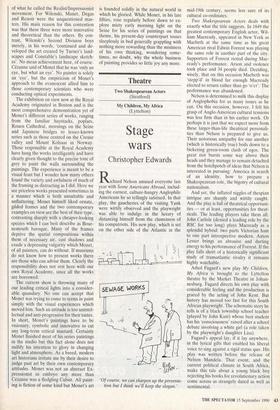Two Shakespearean Actors (Stratford) My Children, My Africa (Lyttelton)
Stage wars
Christopher Edwards
Richard Nelson amused everyone last year with Some Americans Abroad, includ- ing the earnest, culture-hungry Anglophile Americans he so tellingly satirised. In that play, the gaucheries of the visiting Yank were wittily observed and the playwright was able to indulge in the luxury of distancing himself from the clumsiness of his compatriots. His new play, which is set on the other side of the Atlantic in the
'Of course, we can sharpen up the presenta- tion but I think we'll keep the slogan.' mid-19th century, seems less sure of its cultural co-ordinates.
Two Shakespearean Actors deals with exactly what the title suggests. In 1849 the greatest contemporary English actor, Wil- liam Macready, appeared in New York as Macbeth at the same time as his great American rival Edwin Forrest was playing the same role in another part of the city. Supporters of Forrest rioted during Mac- ready's performance. Arson and violence took place and 34 people died. Deciding, wisely, that on this occasion Macbeth was `stepp'd. in blood far enough Macready elected to return rather than go 'o'er'. The performance was abandoned.
Nelson is determined to milk this display of Anglophobia for as many issues as he can. On this occasion, however, I felt his grasp of Anglo-American cultural tensions was less firm than in his earlier work. Or perhaps it is just that we expect more from these larger-than-life theatrical personali- ties than Nelson is prepared to give us. Their notorious antipathy for one another (which is historically true) boils down to a bickering green-room clash of egos. The great riot bursts some way above their heads and they manage to remain detached from the hotchpotch of ideas that Nelson is interested in pursuing: America in search of an identity, how to prepare a Shakespearean role, the bigotry of cultural nationalism.
And yet, the inflated niggles of thespian intrigue are sharply and wittily caught. And the play is full of theatrical opportuni- ties — or at least, opportunities for theat- ricals. The leading players take them all. John Carlisle (denied a leading role by the RSC for too long) plays Macready as a splendid hybrid: two parts Victorian ham to one part introspective modern. Anton Lesser brings an abrasive and darting energy to his performance of Forrest. If the play falls short of a historically significant study of transatlantic rivalry it remains highly watchable.
Athol Fugard's new play My Children, My Africa is brought to the Lyttelton theatre by the Market Theatre in Johan- nesburg. Fugard directs his own play with considerable feeling and the production is graced by the acting of John Kent. But history has moved too fast for this South African playwright. The schematic story he tells is of a black township school teacher (played by John Kani) whose best student has his 'consciousness' raised after a school debate involving a white girl (a role taken by the playwright's daughter Lisa).
Fugard's appeal lay, if it lay anywhere, in the lyrical gifts that enabled his liberal
voice to sing against a rigid status quo. His play was written before the release of Nelson Mandela. That event, and the current political climate in South Africa, make this tale about a young black boy rejecting his books for revolutionary action come across as strangely dated as well as sentimental.


























































 Previous page
Previous page